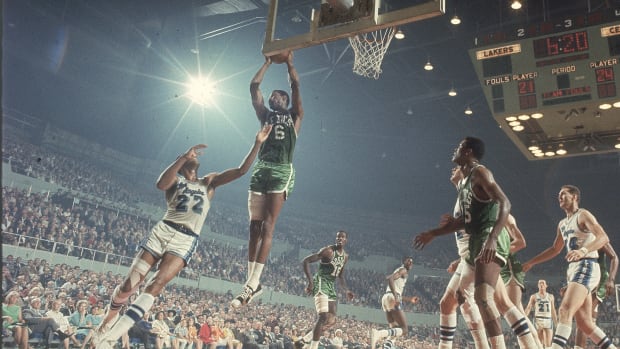BOSTON – For 13 years Bill Russell terrorized opponents on the court, collecting 12 All-Star nods, five MVP awards and 11 NBA championships. For his efforts, the Celtics enshrined Russell’s No. 6 among those that will never be worn again.
The NBA should do the same.
William Felton Russell died Sunday. He was 88. He died less than two months after Stephen Curry picked up his first Finals MVP—an award that is named in Russell’s honor. The NBA has done much to honor Russell’s legacy. It was David Stern who pulled Russell back into the NBA orbit in the mid-1990s, a decade after Russell’s 58-game stint as Kings coach ended. From there it was All-Star appearances, Finals cameos, even a reunion with Wilt Chamberlain, Russell’s longtime rival.
The NBA has gone to great lengths to acknowledge Russell’s accomplishments.
Why not go a little further?
In 1997, at a ceremony during a game between the Dodgers and Mets, then MLB commissioner Bud Selig announced that, once the group of players currently wearing the number gave it up, no one would wear No. 42 again. The decision to retire Jackie Robinson’s number came 25 years after Robinson’s death, a singular honor for the man who broke MLB’s color barrier, the man who was, in the words of Selig, the only single person bigger than the game.
Russell didn’t break the NBA’s color barrier—Earl Lloyd, Chuck Cooper and Nathaniel “Sweetwater” Clifton did that, in 1950—but his accomplishments were every bit as meaningful. He achieved on the floor while fighting comparable elements off it. He battled Chamberlain in front of local fans who defaced his home with racial slurs. He competed against Jerry West the same season he led a strike of an exhibition game because a restaurant in Kentucky would not serve the team’s Black players. He racked up an 11–1 Finals record in a city where, according to Russell, he was referred to as “baboon,” “coon” and “ni-----.

sifullframe
“Boston had a complicated relationship with him,” Tommy Heinsohn once told me. “After we won the championship, the town of Reading honored him at the Reading Country Club. And we all went to this thing. And he was so taken by it, he started to cry. And what his remarks were like, "I want to live in Reading for the rest of my life." And he went to buy another house. And baby, they joined up against him and all kinds of things going on so that he couldn't buy a house.”
He marched with Dr. Martin Luther King, supported desegregation in Boston schools and stood by Muhammad Ali when the boxer refused to fight in the Vietnam War. In 1966, the Celtics tabbed Russell to be its head coach, making Russell first Black coach of a major league team in any sport.
As Jerry West told the Los Angeles Times, “In every generation people make a difference not only with their play, but also with their persona. Bill Russell and Jackie Robinson were in that same class.”
Indeed, Russell is regarded with a rare level of reverence. “A pioneer,” was how Michael Jordan referred to Russell. “My idol,” said Magic Johnson. “My mentor,” said Kareem Abdul-Jabbar. Wrote former president Barack Obama, “As tall as Bill Russell stood, his legacy rises far higher.” Added Charles Barkley, “when your actions match your words on important issues, you are a great man.”
Russell would never ask for his number to be retired. He might even resist it. He did in 1972, when the Celtics raised his number to the rafters, going along with it only after the team agreed to do it in an empty Boston Garden. In 1975, Russell refused to attend his Hall of Fame induction because he believed other Black athletes, including Cooper, deserved to be enshrined first.
He wouldn’t want it. But the NBA should. He earned it. On the court, where Russell averaged 22.5 rebounds, revolutionizing the game with his defensive skills. While some downplay the depth of competition during Russell’s years, what those Celtics accomplished—11 titles in 13 seasons—is a feat that, Bob Cousy told the Boston Globe, “will never be done again in American team sports.” In Russell’s final 14 years as a player, his teams participated in 21 winner-take-all contests—nine NCAA tournament games, one Olympic gold medal game, 10 Game 7s, one deciding Game 5. Russell’s team won all 21.
He earned it off the court, where he took on systematic racism, and won.
He was the NBA’s Robinson. Even Robinson would agree. Late in life, Russell told a story about the day Robinson died. He said he took a call from Robinson’s wife, Rachel, who asked Russell to be a pallbearer at Robinson’s funeral. Of course, Russell said. But why? Rachel replied: You were Jackie’s favorite athlete.
Major League Baseball has made Robinson’s number off limits.
For Russell, the NBA should do the same.







